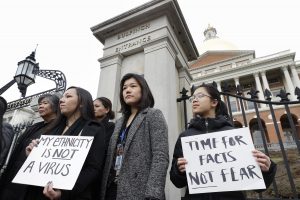He watched me like I was a spider crossing the road. I was pushing my shopping cart toward the front of the Home Depot, aiming to stock up on hand soap and other supplies. He was in a dark green car and had slowed down and stopped to let me cross. He stared at me ominously. As I reached the front of his car, it suddenly lurched forward and then stopped, terrifying me. I was in disbelief … maybe it was an accident? Was he intimidating me? Was it because I’m Asian?
His caustic stare seemed to answer the question.
Some may wonder whether U.S. President Donald Trump’s insistence on using the term “Chinese virus” has fanned the flames of anti-Asian sentiments in the United States in recent weeks. Many Asian-Americans would answer in the affirmative. Certainly, it hasn’t helped.
In the last four weeks, during which Trump has repeatedly and resolutely used the term, countless news stories suggest there has been a spike in verbal and physical assaults on people of Asian descent within the United States. Asian-Americans, people of Asian descent, and anyone deemed to look Chinese are using social media and private online groups to share their experiences. They report everything from insidious microaggressions to outright racist taunts – being called “virus” and other racist names – as well as more serious assaults, including being spat on, robbed at gunpoint, physically attacked for wearing a mask, or even for confronting the person tormenting them. Asian businesses in the United States have been vandalized. New photos and stories of abuse are shared daily.
In February, the World Health Organization (WHO) specifically named the disease caused by coronavirus “COVID-19,” following guidelines issued in 2015 to avoid naming illnesses after locations. These guidelines were specifically established to minimize stigma and blame toward a specific region or ethnic group for the emergence of an illness.
A few days ago, Trump tweeted a rare call for the protection of “our Asian American community.” But Trump continues to defend his use of the term “Chinese virus,” even as more and more Asian-Americans are facing discrimination and abuse. His use of the term, as well as the continued use of “Wuhan virus” by Secretary of State Mike Pompeo, may be helping to spread racialized misinformation that distracts Americans from the reality of the pandemic, and shifts blame onto anyone people think look Chinese, fueling anti-Asian bigotry and xenophobia within the United States.
Leaders can play an important role in ending bigotry; they should never be fostering it.
It doesn’t have to be this way. Regardless of what the administration does, legislators, governors, mayors, and police chiefs have the opportunity to lead the way on messaging that anti-Asian hatred and attacks are unacceptable and dangerous.
Some have. On March 19, California Governor Gavin Newsom closed a speech on COVID-19 by condemning racist assaults, with “deep recognition of the xenophobia and the racism that is being perpetuated against Asians.” When a vicious anti-Asian attack occurred in New York City on March 10, the city’s mayor and New York’s governor both harshly condemned it, and on March 25, the New York attorney general set up a special hotline for New Yorkers to report anti-Asian incidents.
COVID-19 should not be dividing us, but rather bringing us together to work for the common good. We already have an epic health crisis; we don’t need a racialized social crisis as well.
Seashia Vang is a senior Asia associate at Human Rights Watch.

































